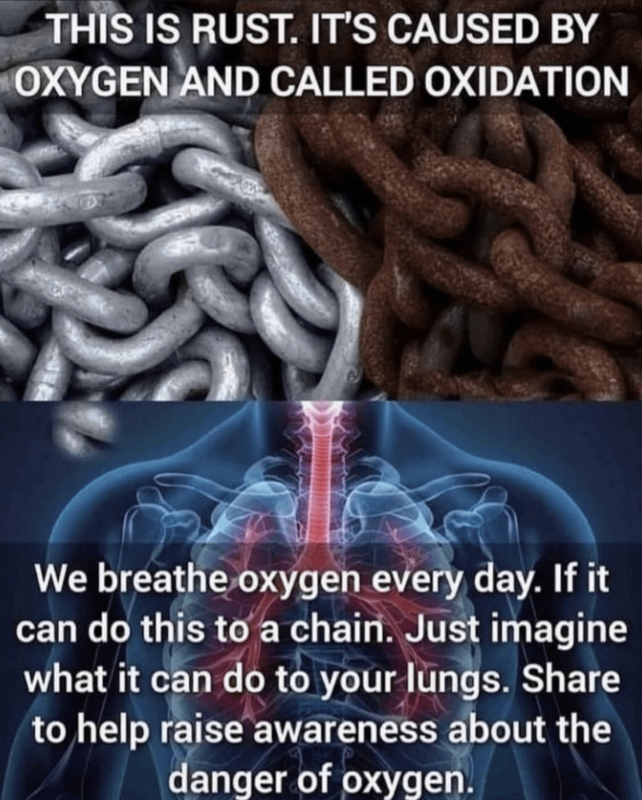Please remember to spread the word about this :(
-
You think that's bad, wait until you hear about dihydrogen monoxide! It's in almost everything, even the water you drink and the air you breathe!
Took me some time
-
I've currently been reducing my oxygen intake. My wife keeps telling me it's impossible and my doc says I'll supposedly die, but they're just hating on my progress.
Big O lackeys are everywhere. They want to keep you alive so they can sell you more O.
-
I've currently been reducing my oxygen intake. My wife keeps telling me it's impossible and my doc says I'll supposedly die, but they're just hating on my progress.
This is a valid athletic technique. Usually achieved by training at altitude.
-
On the topic, as oxidation is a pretty prevalent negative side effect of living, our body has multiple mechanisms to deal with it, no? So my question is: where do the "antioxidants" that we can eat come into the picture here? Are they like preventing oxidation from even occurring, or are they like the shields that our cells use to protect themselves from oxidative stress, or what have you?
Cell mechanisms cause oxidative stress in the body which can lead to inflammation and faster aging. Antioxidants provide the body with an easy way to neutralise the bi-products.
-
wrote on last edited by [email protected]
There are quite a few sci-fi stories and short stories built on a similar concept. One of my favorites is an alien ship lands on a random farm in the US and (leaving a lot of details out, read the book!) it comes to light that the aliens normally live at insanely hot temperatures like 900F (480C) and consider Earth an "Ice World" (that's also the name of the book). Anyway, one of the catches in the book is that farmer figures out the alien wants to trade (again skipping a lot of details) but all he has on him that he can give up is a cigarette (the farmer doesn't know it's super hot inside the ship). He does the trade and we later find out that most of the galaxy is INSANELY vulnerable to being 100% completely utterly addicted to nicotine. When the alien took in the cigarette it instantly vaporized and sent the nicotine into the air and they breathed it and became instantly addicted worse than any opiod addiction IRL.
-
This post did not contain any content.
I mean, oxygen is the most aggressive oxidator, to the point we named the process after it.
-
Unrelated but the bottom navbar in that screenshot makes me long for the Alien Blue days of Reddit. I also just miss that iOS design (along with the OS X Mavericks design)
-
You think that's bad, wait until you hear about dihydrogen monoxide! It's in almost everything, even the water you drink and the air you breathe!
Did you know that dihydrogen monoxide kills more people than any other liquid? And yet, the government does nothing to ban it. This deadly liquid could be anywhere, even in your home!
-
you train your legs and arms and back, but when i train my lungs im told smoking isnt allowed in the restaurant

Yeah restaurants can de pretty shitty, I have been told the same when I do my prostate cancer prevention exercises.
-
This post did not contain any content.
Wait until you read about Dihydrogen Monoxide. Everyone who has ever been exposed to it has died.
-
This post did not contain any content.
100% of people exposed to oxygen die.
-
This is a valid athletic technique. Usually achieved by training at altitude.
wrote on last edited by [email protected]Doesn't it only work if you then return to a lower altitude? I wonder how long the benefits last for.
Now that I think about it, I don't actually know how this even works. Well I know what I'm going to go read about next.
Edit: My findings:
-
At high altitude, cardiac output (the overall rate of blood pumped by the heart) increases, largely due to increased heart rate. This increased heart rate reduces as one acclimatises to high altitude (though I'm unsure of if it returns to baseline. It appears to be complex, and at least somewhat differing person by person. These individual differences may explain why some people experience health problems at high altitude, beyond the initial ill feelings caused from first arriving somewhere that's high altitude)
-
The stroke volume (volume of blood pumped by each beat of the heart) is lower at high altitudes. This does improve as one acclimatises, but not entirely. This seems to be affected by blood pressure stuff, such as reduced plasma volume at high altitude. It seems to be complex enough that we don't fully understand how the various regulatory stuff works.
-
Most of the acclimatisation occurs by increasing the number of red blood cells in the blood. The hormone erythropoietin, which usually exists at a low level in non-hypoxic conditions, stimulates the production of new red blood cells. At high altitude, the level of erythropoietin in the blood rises to around 1000 times its baseline level. Increased production of red blood cells happens for a few weeks, by which point, there is enough to make up for lower oxygen levels at high altitude.
-
When returning to low altitude, it appears that the changes back to the baseline happen over a similar timeline.
Tangential fun fact: a red blood cell has a lifetime of around 4 months. A single red blood cell travels around 400 miles before it is old enough to be recycled by the body.
-
-
This post did not contain any content.
70-80+ years exposure to this stuff is lethal
-
Doesn't it only work if you then return to a lower altitude? I wonder how long the benefits last for.
Now that I think about it, I don't actually know how this even works. Well I know what I'm going to go read about next.
Edit: My findings:
-
At high altitude, cardiac output (the overall rate of blood pumped by the heart) increases, largely due to increased heart rate. This increased heart rate reduces as one acclimatises to high altitude (though I'm unsure of if it returns to baseline. It appears to be complex, and at least somewhat differing person by person. These individual differences may explain why some people experience health problems at high altitude, beyond the initial ill feelings caused from first arriving somewhere that's high altitude)
-
The stroke volume (volume of blood pumped by each beat of the heart) is lower at high altitudes. This does improve as one acclimatises, but not entirely. This seems to be affected by blood pressure stuff, such as reduced plasma volume at high altitude. It seems to be complex enough that we don't fully understand how the various regulatory stuff works.
-
Most of the acclimatisation occurs by increasing the number of red blood cells in the blood. The hormone erythropoietin, which usually exists at a low level in non-hypoxic conditions, stimulates the production of new red blood cells. At high altitude, the level of erythropoietin in the blood rises to around 1000 times its baseline level. Increased production of red blood cells happens for a few weeks, by which point, there is enough to make up for lower oxygen levels at high altitude.
-
When returning to low altitude, it appears that the changes back to the baseline happen over a similar timeline.
Tangential fun fact: a red blood cell has a lifetime of around 4 months. A single red blood cell travels around 400 miles before it is old enough to be recycled by the body.
Its also said that smokers are used to having less oxygen intake so if you throw a smoker and a non smoker on a mountain for a night, the smoker is less likely to get altitude sickness. Long term staying at altitude they'll no longer have the advantage.
-
-
That's the exact theme of many stories on r/HFY
-
Oxidation is how red blood cells collect oxygen to pass to the rest of the body. In fact it is iron in hemoglobin that "rusts" to collect the oxygen. You would die if your blood didn't "rust".
Antioxidants have nothing to do with this.
The process you’re thinking of is oxygenation, not oxidation. Oxygenation is the binding of oxygen to other molecules, oxidation is the loss of electrons. When the iron in hemoglobin oxidizes (from Fe2+ to Fe3+) it stops binding with oxygen, and if it oxidizes further (to Fe4+) it can start oxidizing other molecules in your body. Your body has enzymes to reduce the iron back to a reactive state, but antioxidants also play a role in reducing oxidized molecules.
-
The process you’re thinking of is oxygenation, not oxidation. Oxygenation is the binding of oxygen to other molecules, oxidation is the loss of electrons. When the iron in hemoglobin oxidizes (from Fe2+ to Fe3+) it stops binding with oxygen, and if it oxidizes further (to Fe4+) it can start oxidizing other molecules in your body. Your body has enzymes to reduce the iron back to a reactive state, but antioxidants also play a role in reducing oxidized molecules.
It's actually the opposite. When the oxygen binds to the iron it changes from Fe+2 to Fe+3 so the binding of oxygen to the iron in hemoglobin is an oxidation process. At that point it can't take more oxygen until it releases it in a reduction reaction.
The term "oxidation" is originally derived from reactions where a substance combines with oxygen but has since been generalized to any reaction where an electron is given up. So "oxidation" is the broader term and "oxygenation" is the specific oxidation reaction that results in binding oxygen.
-
Wait until you read about Dihydrogen Monoxide. Everyone who has ever been exposed to it has died.
wrote on last edited by [email protected]Wait till you hear about this ancient roman curse called gravity.
-
Delicious fluorine for me please
I've been thinking about neon. Imagine breathing out multicolour bright lights!
-
Wait until you read about Dihydrogen Monoxide. Everyone who has ever been exposed to it has died.
There's a whole website dedicated to raising awareness of its danger : https://www.dhmo.org/





